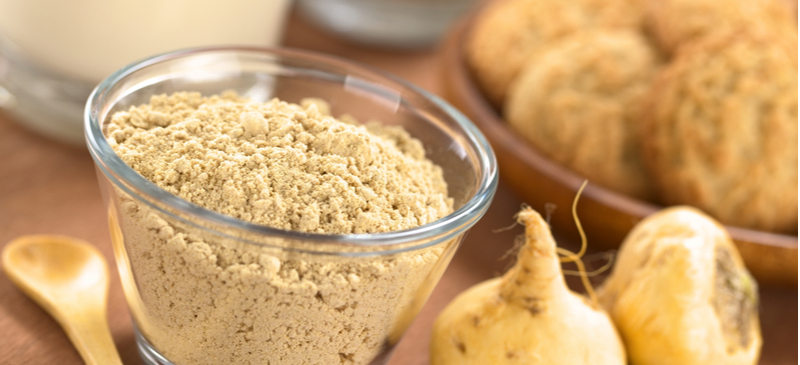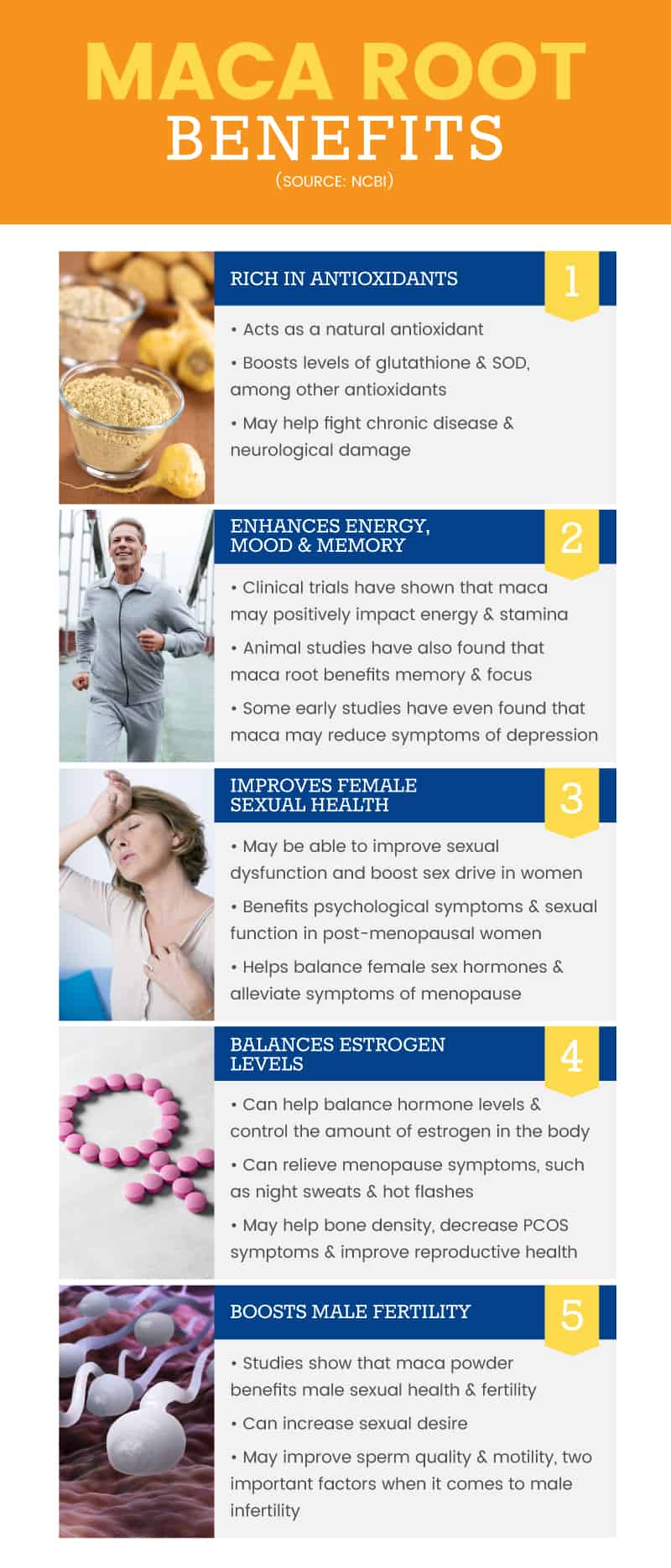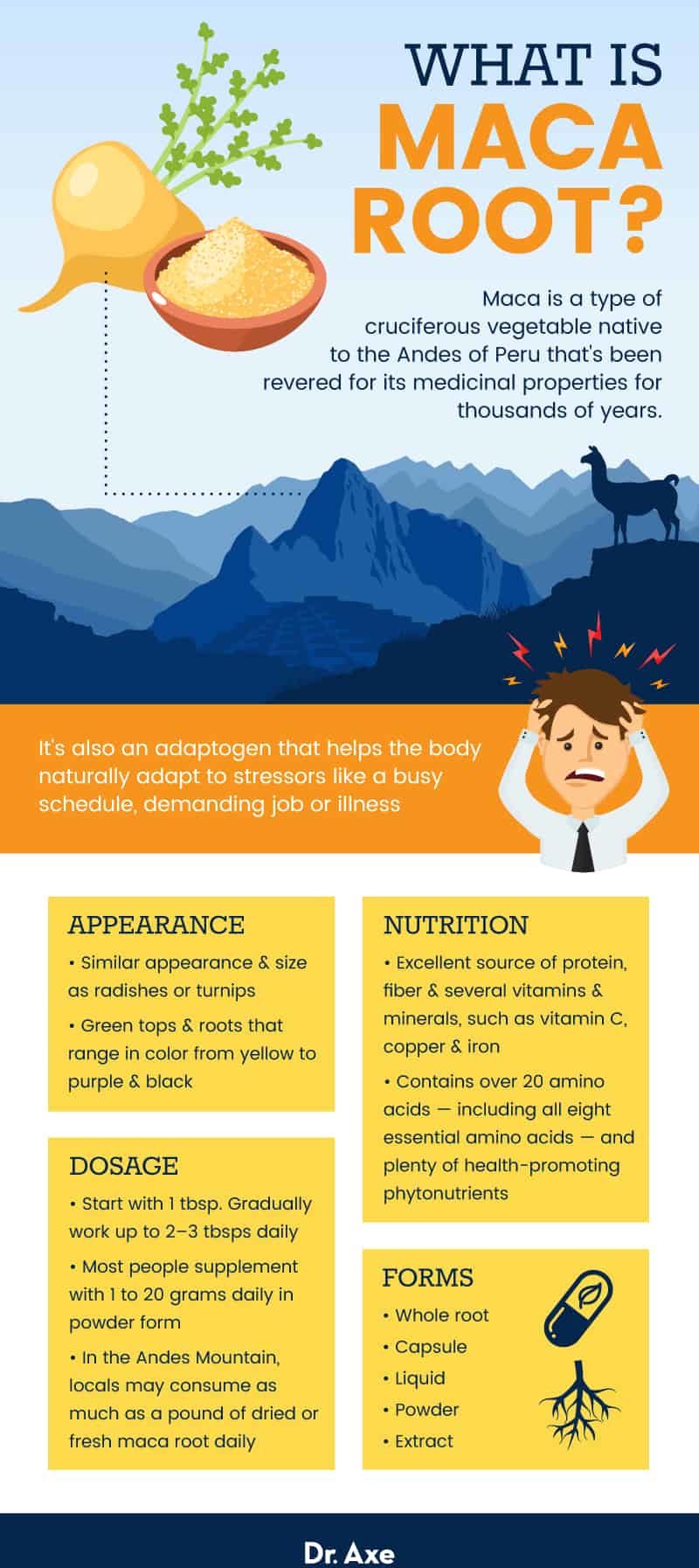
Despite being revered for its medicinal properties for thousands of years, maca root is one of the newest remedies to take center stage in the natural health community, and its newfound superfood status is well-deserved. Researchers are continually turning up new health benefits associated with this powerful root vegetable.
It’s also considered an “adaptogen,” a name given to certain herbs, plants and natural substances that help the body naturally adapt to stressors like a busy schedule, demanding job or illness.
Not only that, but maca provides a host of important micronutrients and is jam-packed with antioxidants, and it has been shown to improve sexual health, balance hormone levels, and boost energy, mood and memory.
What Is Maca Root?
What is maca? Known by its scientific name, Lepidium meyenii, maca is a type of cruciferous vegetable native to the Andes of Peru. Maca has a similar appearance and size as radishes or turnips with green tops and roots that range in color from yellow to purple and black.
The pleasant-tasting root, or hypocotyls, is usually available in powder form after being harvested and grounded down. Not only is it a natural source of healing nutrition, but it also has a long history of being a safe superfood that has been consumed for its health benefits for thousands of years in regions of the Andes Mountains.
The use of maca can be traced back over 3,000 years. Historically, this root vegetable was used by ancient Peruvians as a form of currency for trade and was also treasured for its medicinal properties. It was used to treat an array of ailments, such as menstrual problems, menopause, stomach cancer, fatigue, stress and anemia. It is even said that Incan warriors filled up on maca root before heading into battle to boost their stamina and strength.
During the period when the Inca civilization was flourishing in the Andes region, maca was considered to be incredibly valuable. In fact, its use was even restricted and reserved for royalty only. It was later imported to Spain and used by Spanish royalty to enhance energy levels and supply extra nutrients.
Today, maca is consumed primarily in powder or capsule form. Traditionally, however, the fresh root was cooked and then consumed, as Peruvians believed that eating raw maca could cause digestive and thyroid issues.
Benefits
1. Rich in Antioxidants
Maca root acts as a natural antioxidant, boosting levels of antioxidants like glutathione and superoxide dismutase in the body. Antioxidants help neutralize harmful free radicals, fighting off chronic disease and preventing damage to cells.
One test-tube study in 2014 demonstrated that polysaccharides extracted from maca had high antioxidant activity and were effective in fighting free radical damage.
An animal study in the Czech Republic even found that administering a concentrated dose of maca to rats not only improved their antioxidant status, but also significantly decreased levels of cholesterol and triglycerides in the liver and reduced blood sugar, helping prevent the development of chronic disease. Meanwhile, another test-tube study showed that the antioxidant content of maca leaf extract could even protect against neurological damage.
Improving your antioxidant status may be beneficial for preventing conditions like heart disease, cancer and diabetes by preventing oxidative stress and cell damage. However, despite these promising results, more studies are needed to understand how the antioxidants in maca root may affect humans.
2. Enhances Energy, Mood and Memory
Those who regularly use maca powder report that it makes them feel more awake, energized and driven, often relatively quickly after beginning to use it. Plus, maca can help increase energy without giving you the “jitters” or a sense of shakiness like high level of caffeine can.
Clinical trials have shown that maca may positively impact energy and stamina. Maintaining positive energy levels can also help improve mood, and some early studies have even found that maca may reduce symptoms of depression.
It remains unclear exactly how maca increases energy levels, but it’s believed to help prevent spikes and crashes in blood sugar and maintain adrenal health, which regulates mood and energy throughout the day. Keeping energy levels up may also help prevent weight gain as well.
Several studies have also found that maca root benefits memory and focus. In fact, two animal studies in 2011 found that black maca was able to improve memory impairment in mice, likely thanks to its high antioxidant content.
3. Improves Female Sexual Health
Multiple studies have confirmed that maca benefits female sexual health through several different mechanisms.
Maca root may be able to improve sexual dysfunction and boost sex drive in women. One study looked at the effects of maca root on post-menopausal women with sexual dysfunction caused by the use of antidepressants. Compared to a placebo, maca root was able to significantly improve sexual function. Another study had similar findings, reporting that maca was well-tolerated and able to improve libido and sexual function.
A study in 2008 also found that maca root benefits both psychological symptoms and sexual function in post-menopausal women. In fact, maca was able to reduce menopause-associated depression and anxiety after six weeks of treatment.
Maca is also able to balance female sex hormones and has even been shown to alleviate symptoms of menopause. Balancing hormone levels is crucial to many aspects of reproductive health and can help reduce symptoms like infertility, weight gain and bloating.
READ RELATED: Devin Way Wikipedia: For All Mankind – Who Is He? Age And More Details To Know

4. Balances Estrogen Levels
Estrogen is the primary female sex hormone responsible for regulating the reproductive system. An imbalance in this vital hormone can cause a slew of symptoms ranging from bloating to irregular menstrual periods and mood swings. Estrogen levels that are too high or low can also make it difficult for a woman to ovulate and become pregnant.
Maca root can help balance hormone levels and control the amount of estrogen in the body. One study published in the International Journal of Biomedical Science gave 34 early post-menopausal women a tablet containing either maca or a placebo twice daily for four months. Not only did maca help balance hormone levels, but it also relieved symptoms of menopause, such as night sweats and hot flashes, and even increased bone density.
In addition to reducing symptoms of menopause, regulating estrogen levels may also help with improving reproductive health and fertility and decreasing symptoms related to conditions like polycystic ovary syndrome (PCOS), such as excess hair growth, weight gain and acne.
5. Boosts Male Fertility
So what about maca root for men? While studies don’t support the claim that maca boosts testosterone levels, they do show that maca powder benefits male sexual health and fertility.
One study out of Peru found that supplementing with maca for eight weeks increased sexual desire in men. Meanwhile, another study in 2001 noted that maca helped improve sperm quality and motility, two important factors when it comes to male infertility.
Nutrition Facts
Maca root powder is an excellent source of protein, fiber and several vitamins and minerals, including vitamin C, copper and iron. It also contains over 20 amino acids — including all eight essential amino acids — and plenty of health-promoting phytonutrients. It also contains many beneficial plant compounds, including glucosinolates and polyphenols, and is a popular choice for the vegan diet.
One ounce (or about 2 tablespoons) of maca powder contains approximately:
- 91 calories
- 20 grams carbohydrates
- 4 grams protein
- 1 gram fat
- 2 grams dietary fiber
- 79.8 milligrams vitamin C (133 percent DV)
- 1.7 milligrams copper (84 percent DV)
- 4.1 milligrams iron (23 percent DV)
- 560 milligrams potassium (16 percent DV)
- 0.3 milligram vitamin B6 (16 percent DV)
- 0.2 milligram manganese (11 percent DV)
- 1.6 milligrams niacin (8 percent DV)
- 70 milligrams calcium (7 percent DV)
- 0.1 milligram riboflavin (6 percent DV)
How to Use Maca Root
By this point, you’re probably wondering: “Where can I buy maca? And can I buy organic maca?”
Thanks to its growing popularity, maca is widely available at health stores, pharmacies and even online retailers. It can also be found in capsule, liquid, powder or extract form. All forms are thought to be equally beneficial, but it is best to buy maca from a quality harvester that ensures its 100 percent pure maca root powder. Ideally, including for maca extract, you should also look for a variety that is raw and organic.
Additionally, maca is categorized based on the color of its roots and is most commonly yellow, black or red. All colors of maca have similar benefits, although specific maca types and colors are thought to be more beneficial for certain medical conditions. Red maca powder is the most common supplement form. Gelatinized maca powder is sometimes referred to as maca flour.
Maca tends to have an earthy, slightly nutty taste with a hint of butterscotch that works especially well when added to oatmeal or cereal. The flavor can also vary based on the type of maca, with black maca being a bit more bitter and cream-colored roots having an even sweeter taste. Maca powder can be easily added to smoothies and drinks or mixed into recipes.
Keep in mind that most people prefer not to microwave or heat their maca powder at high temperatures as the heating process may diminish some of the nutrients.
In the Andes Mountain where maca cultivation occurs, locals may consume as much as a pound of dried or fresh maca root daily. Most people supplement with somewhere between one gram to 20 grams daily in powder form.
Although there is no official recommended maca powder dosage, it’s best to start out with about one tablespoon (in powder form) daily and work your way up to two to three tablespoons spread throughout the day. Because maca is known for increasing energy and stamina, many people like to take it before exercising to get a burst of extra energy.

Maca Root vs. Ginseng
Like maca, ginseng is a plant with fleshy roots and potent medicinal properties. Both have been used in traditional medicine for centuries and are believed to carry similar health benefits, such as enhanced memory, increased energy levels, reduced menopause symptoms and lower blood sugar. Ginseng and maca also both contain antioxidants and have powerful anti-inflammatory powers as well.
However, there are some distinct differences that set these two root vegetables apart. First of all, there is a greater amount of research on ginseng, and it has been associated with a wider range of unique health benefits.
Additionally, while maca root is actually considered a cruciferous vegetable like broccoli or Brussels sprouts, ginseng belongs to the Araliaceae family of plants, which is composed primarily of tropical shrubs and trees. Ginseng also tends to be more bitter while maca has an earthy, nutty taste that is often added to recipes and drinks to boost both the nutrient content and the flavor profile.
Side Effects and Precautions
Maca is safe for most people and can be consumed with minimal risk of maca side effects. That being said, there are some people who may want to moderate their intake.
If you have any thyroid problems, you should keep maca intake in moderation and avoid consuming it raw. This is because it contains goitrogens, which are substances that can impair thyroid function, especially in those with thyroid issues. Check with your doctor before taking maca if you have hypothyroidism or a history of thyroid problems.
Because of maca’s effects on hormone levels, physicians believe that maca should not be consumed by people who rely on hormone-altering medications for the treatment of illnesses like breast cancer or prostate cancer, for example, or for other serious conditions. People who have high blood pressure are also advised to not consume maca to avoid adverse maca root side effects.
Finally, there is limited research on the safety of maca for women who are pregnant or breastfeeding. Until it is confirmed to be safe, it’s best for these women to avoid maca.
Final Thoughts
- Maca is a root vegetable that is high in antioxidants and nutrients, such as vitamin C, copper and iron.
- It has been used medicinally for thousands of years and has been shown to enhance sexual health and libido; improve energy, mood and memory; and balance hormone levels.
- Maca is widely available at health stores, pharmacies and online retailers in capsule, powder, extract or liquid form.
- It can be easily added to smoothies or meals and is often used before exercising to boost energy levels.
- Coupled with a nutritious diet and healthy lifestyle, adding one to two tablespoons of maca into your diet may help give your health an upgrade.
Source:








